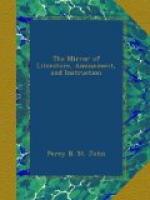Alack! Alack! that every thick-
skull’d lad must find
an antidote
For England’s woes, because, like
Dick.
He has put on a long-tail’d
Coat.
But lo! my rhymes begin to fail,
Nor can I longer time devote;
Thus rhyme and time cut short the tale,
The long tale of Dick’s
long-tail’d Coat.
Blackwood’s Magazine.
* * * * *
SIR JOHN HAWKINS’S HISTORY OF MUSIC.
The fate of this work was decided like that of many more important things, by a trifle, a word, a pun. A ballad, chanted by a fille-de-chambre, undermined the colossal power of Alberoni; a single line of Frederic the Second, reflecting not on the politics but the poetry of a French minister, plunged France into the seven years’ war; and a pun condemned Sir John Hawkins’s sixteen years’ labour to long obscurity and oblivion. Some wag wrote the following catch, which Dr. Callcott set to music:—
“Have you read Sir John Hawkins’s History? Some folks think it quite a mystery; Both I have, and I aver That Burney’s History I prefer.”
Burn his History was straightway in every one’s mouth; and the bookseller, if he did not follow the advice a pied de la lettre, actually wasted, as the term is, or sold for waste paper, some hundred copies, and buried the rest of the impression in the profoundest depth of a damp cellar, as an article never likely to be called for, so that now hardly a copy can be procured undamaged by damp and mildew. It has been for some time, however, rising,—is rising,—and the more it is read and known, the more it ought to rise in public estimation and demand.—Harmonicon.
* * * * *
ITALIAN, AT THE KING’S THEATRE.
A Liberal and sensible correspondent of the Harmonicon writes thus:
Mrs. Wood is not the first of our countrywomen who has attained the same rank; the names of Billington, Cecilia Davies (called Inglesina,) and in remoter times, that of Anastasia Robinson, (afterwards Countess of Peterborough,) will immediately occur to the musical reader; but, with the exception of the latter, who lived at a time when the Italian opera in England was in its infancy, Mrs. Wood is, if I mistake not, the first Englishwoman who has achieved that distinction without a certificate of character from Italy. Even Billington was not thought worthy of our opera stage until she had delighted the audiences of San Carlo, the Scala, and the Fenice. Mrs. Wood, on the other hand, is our own, and wholly our own; she has not basked in the suns of Naples, nor breathed the musical atmosphere of Venice or Milan; yet I, who am an old stager, like Iago, “nothing if not critical,” and have heard every prima donna from Billington down to this present writing, have seldom uttered any brava with more unction than when listening to Mrs. Wood’s Angelina and Ottavia.




